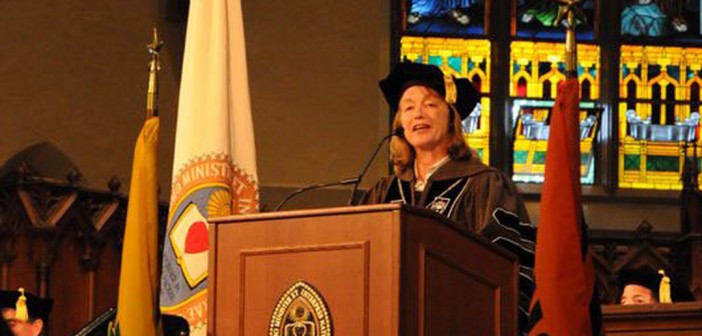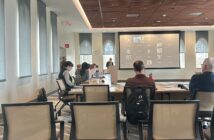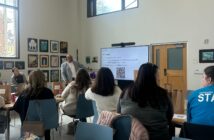KM: What initially attracted you to Lehigh?
AG: The focus on students. Really recognizing how faculty, staff and the student body itself are very much engaged in making the very best student experience. It really is special here.
KM: Part of your presidency was during the Recession of 2008. How did you and the university respond to the financial difficulties during that time and in the wake of the recession?
AG: One bright spot was that we were able to keep hiring faculty through the recession. A lot of schools had hiring freezes that allowed us to attract absolutely terrific faculty because there was less competition from other schools.
We prepared for and set aside a reserve for financial aid. We were concerned that we would have more needy students and they would be needier. The financial aid budget hasn’t grown that much, but we are prepared because sometimes the impact is sometimes delayed, the impact is on people whose kids are smaller and they haven’t saved up for college yet.
We did a lot of trimming of the staff, some of it through attrition, reorganizing spaces and cover staffing needs with fewer staff. Also we had very prudent management of our endowment and looked at costs of facilities and grounds and the big infrastructure.
At the same time with the government funding slowing down, we benefitted from philanthropy for research like the Strohl and Smith funds for research for undergraduates. That is important because when competing for large grants on national scale and don’t have state funding anymore, need to get some results to show project has viability so that philanthropy has been really important.
KM: What attracted you to the Imperial College of London? What do you think will be the challenges of leading a non-American college?
AG: Imperial is a really terrific university and has excellent research and education programs. It is about twice the size of Lehigh and has a very strong focus on engineering, business, natural sciences and medicine. The incredible research advances coming out every day are very inspiring and exciting. They are looking to change to a slightly more American model, hired first provost, which allows the president to spend a bit more time externally focused.
Imperial has a vast international alumni base and London is a great hub for global enterprises, so the education, students and alumni are all broadly international. It is an example of a university moving into the true next era of higher education where research and teaching are combined and interconnected.
They are looking for the president to have an external focus and connect on philanthropy and fundraising, as well as corporate engagements and international engagements so I am very excited about that. I love to advocate for higher education and research, so that is more of an opportunity to do that, but on a slightly different platform and scale.
KM: There is a conception among students that you are anti-Greek life. Do you feel as though the Greek community helps or hinders Lehigh University? When starting here, what were your goals or hopes for Greek life?
AG: We really pride ourselves and stand for student leadership and having students have experiential learning opportunities. At Lehigh that transcends to living arrangements and social organizations…in managing and running your own living group, I think there are tremendous opportunities for those types of experiences and for strong student leadership. Sometimes those leaders are very successful, and other times, they need help.The accreditation process has helped chapters be able to find their path or have some guidelines and things they strive for.
We are just forming a commission to take a broad look at the residential environment in general. I think the time is right to look at how to make sure to we are continually improving. The accreditation process was set up out of a study 10 years ago, and it is time to look again and say the world has changed, the student body has changed, how do we keep evolving the structures so are continually improving.Change is never easy, but we have change.Even over the last five to 10 years, there has been a lot of a change in the makeup of the student body, the one Lehigh, and having more cohesion between colleges. I think the unity efforts and some of the work to have all campus parties, fire and ice balls, whatever there are, there is a lot more of the spirit of trying to do that and not be in their department or house or chapter or one area, students want to come together.
KM: There have been several chapters removed over the past 10 years, but also a lot of growth in the Multicultural Greek, Panhellenic and IFC communities. Do you think this growth is important?
AG: Evolution is important in the Greek community because what may have worked 40 years ago might be different today. One of the great things about universities is the ability to bring traditions from past forward. As long as those traditions are based on important core values and things that want to learn as a young person, they are wonderful to be a part of and associated with.
The need to change comes from the fact that students today are looking for different social structures than they were 10 years ago. That’s the opportunity and the challenge: to be flexible and welcome new organizations and students who want to get behind making something new. Also to help older organizations evolve to carry forth traditions but also be appropriate for the times.
KM: There are administrators and student leaders working to change things. Have you thought at all about how to target those who are causing all of these issues?
AG: In order to target people who are really not getting it and being offensive and problematic, I think the most effective approach comes down to peer pressure in the entire community saying this is not Lehigh, this is not what we stand for and is not tolerated. The challenge with something like Yik Yak is the anonymity. It is corrosive, cowardly and terrible. It is very difficult to deal with until people say we don’t believe this is right, we are not going to tolerate it, and going to shut it down ourselves because social media is a crowd kind of thing.
There has been a lot of coming together on campus to really get at the root issues of uncivil, disrespectful, and just unconscionable behavior. We need to all hold each other accountable. I think it is important to have a strong disciplinary system and policies, and we do, so when perpetuator of despicable act is found they can have consequences.
KM: There have been many issues regarding inclusion on our campus in the past year. What do you think the administration has done or can continue to do or improve on so that all students can feel included here?
AG: We’ve been working in front, (it’s) important for the administration to set the tone and make sure policies are sound, and that everyone knows how important this is. We also work behind the scenes because a lot of change happens when people who are closely connected to students and faculty can get things moving forward. Small things and big things all matter, opportunities to have more campus-wide unity events and supporting those type of things, as well as the very thoughtful ideas put forth by FBR like the summer institute, which is being launched this summer. They came forward and said we really think students coming into Lehigh, especially those who are the first in their family to come to college, would benefit…to get ready for the university. What is nice is trustees and alumni are also interested in helping and the first-year students can get mentorship and professional development.
KM: Not all change can be top-down, so how do you think the student body and student leaders can help improve inclusion on our campus?
AG: I think part of it is raising awareness and having the dialogue. Also, making campus unity part of every day, not just a week in the year. It is your day-to-day, and I think it is a challenge in our society; (it’s) not just at Lehigh that everyone is hyper busy. We all have our sources of info and media, have our friends and people we interact with. We need to consciously and purposefully take advantage of the opportunity to get to know people not in our little circle.
Students can be proactive in that, they can sit in different places in class, eat with different people, make sure to have different types of gatherings in the evening. These can be small unity events, not all-campus unity events. This is the opportunity to make the best use of your four years here and get to know one another. Also to accept that people make mistakes and learn from those and not make people feel badly, but make them feel as though there is an opportunity to learn how to be a better friend, classmate or colleague. When someone says something that could be viewed as offensive or that you take offense to, call them out on it in a nice way that makes them think about it.
KM: What is your favorite local restaurant?
AG: If I had to pick one, I would have to pick The Goose. In terms of most meals eaten, it definitely would be the Goose. I love to eat at Jenny’s, La Lupita, Sal’s, all of the usual hangouts. My son loves Horns and Tulum. I (hardly) eat in North Bethlehem at all. Olive Branch is a middle eastern on place on Broadway, with great hummus and falafel.
KM: What are some of the things you like to do in your free time (if you have any)?
AG: I sometimes like to bake scones, coffee cake and pies. I don’t always get to do that, but I try. I like hiking, but hiking around here is tough. As someone who grew up in California with the huge vistas, it is a different but (good) workout with the big mountains around here.
I also like to run and jog on Goodman Campus; I like to run barefoot, and Goodman is a great place to do it. I would hazard to guess that Lehigh would be the number one campus for barefoot running, with all of the contiguous grass. My knees were hurting after I got here. (I read a) book called Born to Run; it talks about how, if you are barefoot, the feet take more of shock because they are natural springs. Some people have seen me over there and I’ll get comments from a team saying “nice shoes,” but it’s not that widely known that I run barefoot.
KM: What will you miss most about being president of Lehigh?
AG: There are a lot of things, but I think it’s the campus spirit and camaraderie, especially the ability to go with students and see a music event one night by a student group and athletic event the next day. There is a well-rounded student experience that I vicariously get to enjoy by attending those things. I have grown quite fond of the place and the people. It is always exciting to me when an alum from a just a few years ago comes back and I hear what they have been doing and get to enjoy their new experiences and the relationships we built when they were here.
Story by Brown and White opinion writer Kerry Mallett, ’15.






Comment policy
Comments posted to The Brown and White website are reviewed by a moderator before being approved. Incendiary speech or harassing language, including comments targeted at individuals, may be deemed unacceptable and not published. Spam and other soliciting will also be declined.
The Brown and White also reserves the right to not publish entirely anonymous comments.